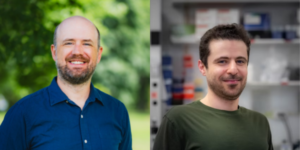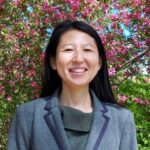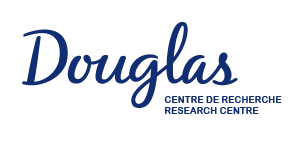<< Back to open science
 The Douglas Open Science Awards support graduate and postdoctoral projects that advance open science at the Douglas Research Centre and in mental health. Successful proposals benefit not only the project submitted but also have a lasting impact at the Douglas and in the broader research community.
The Douglas Open Science Awards support graduate and postdoctoral projects that advance open science at the Douglas Research Centre and in mental health. Successful proposals benefit not only the project submitted but also have a lasting impact at the Douglas and in the broader research community.
Awardees receive ongoing mentorship and financial support: besides receiving funding to foster open science practices, awardees are accompanied by the Douglas Open Science Team through a 1-year mentorship program.
This awards program is supported by the Tanenbaum Open Science Institute (TOSI) and the Douglas Foundation.
Consult the “Past competitions” section to learn about projects previously funded by the Douglas Open Science Awards!
Douglas Open Science Awards 2025
- Drs. James Carmichael & Javad Karmimi Abadchi (joint award), with Drs. Sylvain Williams & Mark Brandon, for their project: “The MiniDrive: a low-cost open tool for combining high-density calcium imaging and electrophysiology”

- Dr. Sakiko Yamaguchi, with Dr. Manuela Ferrari, for their project: “Open science for equity, diversity, inclusion, and accessibility: creation of plain language summaries with patient-partners”

Application
Applications are now closed.
Key dates
- Call for applications closes: May 1st 2025 at 4:00 PM EDT
- Announcement of results: Summer 2025
- Progress report presentation: 2026, date to be announced at least 1 month in advance
Eligible projects advance and have a lasting impact in open science at the Douglas and in mental health. Projects can involve a wide range of open science practices such as community engagement, reuse of open data or open sharing of datasets, methods or other research outputs. Projects must align with the Douglas Open Science Principles.
For example, trainees can submit projects that:
- Share research outputs as openly as possible, including but not limited to data, metadata, samples, protocols, measures for behavioral assessment, software, and hardware. Applicants may apply for funding for sharing and for producing the research outputs to be shared.
- Develop infrastructure or educational resources to share research outputs such as the ones listed above.
- Use existing open research outputs in ways that are novel, creative, and impactful, including for data analysis or knowledge mobilization activities.
- Engage the community in their research projects, for example through focus groups, patient partners, or other knowledge mobilization activities.
All applicants and co-applicants must be graduate students or postdoctoral fellows carrying out research activities at the Douglas at the funding start date (i.e. announcement of the results of the competition). Applicants may apply individually or as small groups. We encourage adding co-applicants with complementary skills to your application.
In the event that all the awardees involved in a project leave the Douglas before the project’s completion, the principal investigator is responsible for contacting the Douglas Open Science Team to assign substitutes or return the funds.
Past awardees are eligible applicants. If the proposed project is a continuation of an already-funded project, the applicants must clearly describe the added impact of the newly proposed activities.
The total envelope for this competition is up to $10,000, to be split into 2-5 projects for a maximum of $5,000 per project. Proposals budgeting smaller amounts are acceptable and encouraged. Principal investigators are responsible for managing the funds and authorizing expenses aligned with the original goals of the project.
Funds will be transferred to the trainees’ principal investigator shortly after the funding start date (i.e. announcement of the results of the competition). Projects should aim to spend the funds within 1 year of the funding start date.
The Douglas Open Science Awards fund activities that foster open science practices and educate a new generation well-versed in open science. When proposing a budget, applicants must ask themselves if the requested items align with open science values: for example, can a commercial resource be substituted by an open or not-for-profit alternative (e.g., open software, academic or governmental computational infrastructure)? If not, applicants must justify their choice. From an educational perspective, awardees are expected to master open science practices themselves, potentially also extending their knowledge to interns. As such, expenses that delegate core open science skills or activities to practicing professionals will not be eligible.
Examples of eligible expenses are costs related to:
- Compensation for interns under co-supervision and mentoring by the awardees.
- Community engagement in research (e.g., compensation of patient partners or focus group participants) and event organization.
- Equipment (e.g., computers, cameras) not redundant with the ones available in institutional shared-use facilities such as the VIVA studio or research platforms.
- Data collection (e.g., equipment use fees, materials), access (e.g., cost-recovery fees for accessing open data), processing, and storage.
- Hosting applications or webpages.
- Support services and consultations (e.g., programmer, knowledge mobilization specialist).
Ineligible expenses are costs related to:
- Article processing charges (APCs) – consult here discounts by McGill University.
- Services that delegate core open science skills or activities to practicing professionals – awardees must acquire new open science skills and lead the generation of the project’s outputs.
- Subscription fees for commercial tools – in the spirit of open science, awardees are encouraged to employ open alternatives.
- Trainee stipends for the awardees themselves.
- Transcription, translation, copyediting, and proofreading services.
- Travel costs and conference attendance fees, which may be supported by other programs such as the Marie Giguère Travel Awards.
Awardees agree to:
- Participate in 2-3 mentoring meetings with the Douglas Open Science Team.
- Report progress and lessons learned in a seminar, webinar, or poster presentation, to be held approximately 1 year after the announcement of the award results. Awardees will be notified of the presentation date at least 1 month in advance.
- Acknowledge funding by the Douglas Open Science Awards in all outputs originating from the funded project.
- Follow the Douglas Open Science Principles in the execution of the project.
- Follow the Douglas Open Access Policy should the project lead to any peer-reviewed publications.
Principal investigators agree to:
- Manage the awarded funds and authorize expenses aligned with the original goals of the project.
- Contact the Douglas Open Science Team to assign substitutes or return the funds should all awardees involved in the project leave the Douglas before the project’s completion.
Applications will be reviewed by the Douglas Open Science Team jointly with invited external evaluators and the Douglas Executive Committee. Awardees will be selected based on the following evaluation criteria:
- Feasibility (1 point)
- Are the goals of the project realistic within a 1-year timeframe?
- Is the requested budget (or are specific budget items) justified by the goals?
- Alignment with the Douglas Open Science Program (1 point)
- Does the project demonstrate a good use and knowledge of Open Science?
- Does the project clearly align with at least one of the Douglas Open Science Principles?
- Does the project clearly articulate how it aligns with the best fitting principle(s)?
- Impact and contribution to advancing open science at the Douglas and beyond (1 point)
- Does the project demonstrate a potential sustainable impact in open science at the Douglas, addressing a current gap or obstacle?
- Does the project demonstrate a potential sustainable impact in open science beyond the Douglas, by proposing innovative open science activities?
- Does the candidate identify a target audience that can reuse and adapt the project output?
- Does the project adopt OS strategies to facilitate reuse of its contributions (e.g., open research outputs, open knowledge mobilization, open licenses, FAIR principles)?
For questions or more information please contact:
Isabel Bacellar, PhD
Program Coordinator, Douglas Open Science Program
open.science.ouverte.comtl@ssss.gouv.qc.ca
Past competitions

- Lyne Baaj & Gabriella Malamud (joint award), with Dr. Rachel Rabin, for their project: “Monthly Mental Health Newsletter”
- Mohammadali Javanray, Ting Qiu & Jonathan Gallego Rudolf (joint award), with Dr. Sylvia Villeneuve, for their project: “Open Access neuroimaging data derivatives from the PREVENT-AD Cohort: A longitudinal study of presymptomatic Alzheimer’s disease”
- Eleni Sofouli, with Dr. Myra Piat, for their project: “Sustaining peer support for people with mental health challenges: Digital research outputs”

- Anjali Chawla & Malosree Maitra, (joint award), with Drs. Corina Nagy & Gustavo Turecki, for a project called: “Interactive explorations of multimodal single-nucleus sequencing of the brain in major depressive disorder” – Learn more about this project here.
- Dr. Katie Lavigne, with Drs. Martin Lepage & Alan Evans, for a project entitled: “CONP-Experiments: An open-source neuroimaging experiment-sharing platform” – Learn more about this project here.
- Kristelle Alunni-Menichini, with Drs Michel Perreault et Brigitte Vachon, for a project called: “DIALOG’, a collaborative blog” – Learn more about this project here.

